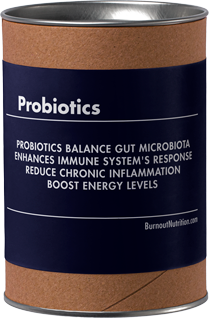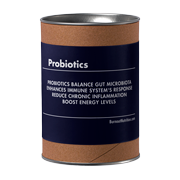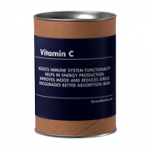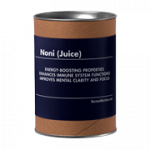Probiotics are beneficial bacteria which when consumed in adequate amounts can offer various health benefits. They are often used to restore the natural balance of bacteria in our gut. This is essential for people with Chronic Fatigue Syndrome (CFS) who may have an altered gut microbiota which can negatively impact their health.
The gut is key to our overall health and impacts our mental state and energy levels. People with CFS often have poor gut health, leading to inefficient nutrient absorption and immune system imbalances, both of which can contribute to feelings of fatigue.
Probiotics can help to restore a healthy balance of bacteria in the gut, supporting the efficient absorption of nutrients and helping to boost the immune system. This can contribute to improved energy levels, reduced inflammatory response, and overall, a better feeling of wellbeing.

- Probiotics balance gut microbiota.
- Enhances immune system’s response.
- Reduce chronic inflammation.
- Boost energy levels.
- Alleviate stress and insomnia.
Probiotics: Purchase | Dosage | Benefits | Science
Buy Probiotics online:
Important Note: This information serves as a guideline only and should NOT replace specialist advice. Always consult your doctor, pharmacist or a health care professional like a nutritionist before starting any new treatment.
Probiotics Dosage for Chronic Fatigue
There are no official daily recommended doses for probiotics, but here are some recommendations based on general research regarding probiotics use in managing Chronic Fatigue Syndrome (CFS). However, please consult a healthcare professional for precise dosage and guidance:
- Adults aged 18-64: A typical dose could include 1 to 10 billion colony-forming units (CFUs) daily for most Lactobacilli or Bifidobacterium strains.
- Elderly (over 65): Similar to younger adults, 1-10 billion CFUs of Lactobacilli or Bifidobacterium strains could be suitable, but it’s essential to consult a healthcare provider due to potentially weakened immunity.
- Children (under 12): Dosage could be halved to 0.5-5 billion CFUs daily, again depending on the child’s overall health, weight and dietary needs. Similarly, consultation with a paediatrician is necessary.
Probiotic doses can be spread throughout the day instead of given all at once to better support gut flora.
Note: This information is provided as a general guideline and might not be suitable for everyone. Always consult with a healthcare professional before making any changes to your, or your child’s, medication or supplementation routine.
Probiotics Benefits for Chronic Fatigue
- Improves gut microbial balance.
- Promotes better sleep patterns.
- Boosts immune system function.
- Aids in nutrient absorption.
- Helps to reduce inflammation.
- Boosted Immune System: Probiotics introduce healthy bacteria into the gut, which may contribute to a stronger immune system. People wth chronic fatigue syndrome often suffer from a weaker immune system, so probiotics can help in fighting off infections and illness.
- Improved Gut Health: Patients with chronic fatigue syndrome often report gastrointestinal problems. Probiotics can help restore the balance of bacteria in the gut, leading to improved digestion and nutrient absorption.
- Reduced Fatigue: There is some evidence suggesting that probiotics can help reduce the fatigue symptoms commonly associated with this syndrome.
- Improved Mental Health: The gut is sometimes referred to as “the second brain.” An unhealthy gut can lead to anxiety and depression. As probiotics restore gut health, they may also help improve mental health.
- Reduced Inflammation: Chronic inflammation is a common symptom in chronic fatigue syndrome. Probiotics can reduce inflammation in the body, which may help reduce the overall sensation of fatigue.
Probiotics & Burnout/CFS Science
A Systematic Review of Probiotic Interventions for Gastrointestinal Symptoms and Irritable Bowel Syndrome in Chronic Fatigue Syndrome/Myalgic Encephalomyelitis (CFS/ME) | ⏍
This study conducted a systematic review of gastrointestinal and irritable bowel symptoms in CFS/ME, along with the potential role of probiotics as a treatment. The review included 25 studies and found that while the evidence for using probiotics in irritable bowel syndrome (IBS) was excellent, the evidence for CFS/ME was limited and of poor quality, indicating the need for more standardized and higher-quality research in this area.
Are Probiotic Treatments Useful on Fibromyalgia Syndrome or Chronic Fatigue Syndrome Patients? A Systematic Review | ⏍
This paper reviews the impact of probiotic treatments on fibromyalgia syndrome (FMS) and CFS patients. The review included two high-quality studies that suggested probiotics might have significant effects on anxiety and inflammatory processes in CFS patients. However, the evidence remains limited, and the paper calls for more experimental research focused on symptoms of these pathologies.
Role of Gut Microbiota and Probiotic in Chronic Fatigue Syndrome | ⏍
This article explores the potential role of gut microbiota and probiotics in managing Chronic Fatigue Syndrome. It delves into the underlying mechanisms and discusses how probiotics could influence CFS symptoms.
The Emerging Role of Gut Microbiota in Myalgic Encephalomyelitis/Chronic Fatigue Syndrome | ⏍
This research highlights the emerging understanding of the gut microbiota’s role in ME/CFS. It reviews the symptoms, such as chronic pain and cognitive dysfunction, and examines how gut microbiota may be involved in these processes.
Reduced diversity and altered composition of the gut microbiome in individuals with myalgic encephalomyelitis/chronic fatigue syndrome | ⏍
This study investigates the differences in gut microbiome composition between ME/CFS patients and healthy individuals. It found significant disparities in microbial diversity and composition, providing insight into how these differences might relate to ME/CFS symptoms.
Natural sources of Probiotics
There are several good natural sources of Probiotics which include:
- Yogurt, especially those made from live culture.
- Pickles or better known as fermented cucumbers.
- Sourdough bread made from Lactobacillus bacteria.
- Kefir, a fermented probiotic milk drink.
- Sauerkraut, which is fermented cabbage.
- Miso soup, a Japanese fermented soybean paste.
- Kimchi, a famous Korean side dish which is fermented with Lactic acid bacteria.
- Tempeh, a fermented soy product from Indonesia.
Remember, natural sources of Probiotics not only help our digestion process but also boost our immunity and help us maintain our overall health.

Our favourite Probiotics brand
We recommend Garden of Life brand Probiotics because they are:
- (Mostly) from Organic Agriculture
- Very High quality
- Mostly available
- Reviews back up our positive experience
Our favourite probiotic blend
- Garden of Life Mood+ (not always available). Mood+ Probiotic delivers 50 Billion CFU across 16 Probiotic Strains including Clinically Studied probiotics, plus 350 mg of Organic Ashwagandha and Alaskan Blueberry for stress management.
Organic Probiotics options
We recommend Garden of Life because many of their products are certified organic, but there are other probiotics which only contain the probiotic and organic substrates/additives.
Vegan Probiotics options
There are several officially vegan probiotic options.





